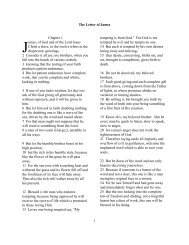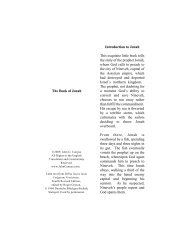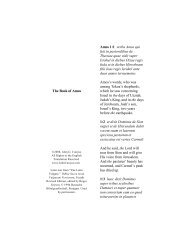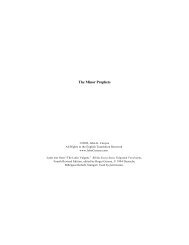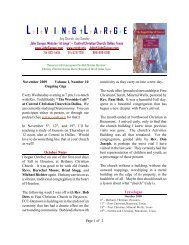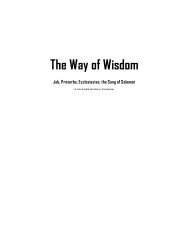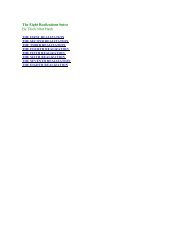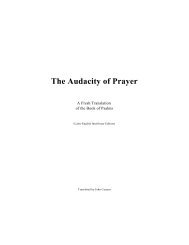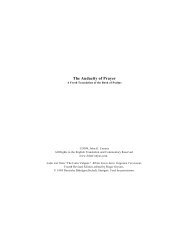You also want an ePaper? Increase the reach of your titles
YUMPU automatically turns print PDFs into web optimized ePapers that Google loves.
<strong>Proverbs</strong>, 6<br />
Introduction to <strong>Proverbs</strong><br />
Return to Table of Contents<br />
As the first verse of the Book of <strong>Proverbs</strong> makes clear, Jewish and Christian traditions both long<br />
9<br />
assumed that King Solomon was its author . The book itself acknowledges the contributions<br />
made by others to its composition. The collection of proverbs from chapters 25 through 29 are<br />
presented as, proverbs of Solomon which the men of Hezekiah king of Judah copied. Chapter 30<br />
is presented as “The words of Agur son of Jakeh of Massa,” though Jerome translates the names<br />
more colorfully. Chapter 31 is ascribed to King Lemuel. Neither Agur nor Lemuel appear<br />
elsewhere in the Bible.<br />
The book is divided into the following sections:<br />
• Chapters 1-9, contains the intertwining of several similar themes: exhortations to youth;<br />
10<br />
hymns praising Wisdom, and speeches by Wisdom herself .<br />
• Chapters 10-22:16, offers us the largest collection of Solomon’s proverbs.<br />
• Chapters 22:17-25, presents further instructions on living wisely, differing in format<br />
from the two-line couplets of the previous section.<br />
• Chapters 25 through 29 shares further Solomonic proverbs, as described above.<br />
• Chapters 30 and 31 gives the appended words of Agur and Lemuel.<br />
The book contains religious poetry, a form that is more or less familiar to us. It contains<br />
exhortations, a scholarly term many of us are not familiar with. An exhortation urges us to<br />
behave in a certain way. Parents often exhort their children, in more or less colorful language, to<br />
clean up their rooms or do their homework. We may not know the word “exhortation,” but all of<br />
us know what it means to be exhorted.<br />
It also contains the proverbs themselves. <strong>Proverbs</strong> are brief, episodic lessons in applied wisdom.<br />
<strong>Proverbs</strong> are written in such a way that, when we read them, our minds tend to fill in the blanks<br />
with real-life experiences. We find the proverbs relevant to our lives, however distant they may<br />
seem from us in space and time. In the words of Baba Ram Dass, they have “an intuitive<br />
11<br />
validity .”<br />
<strong>Proverbs</strong> have come down to us from many sources and traditions. Through them, teachers try<br />
to communicate to us the essence of what it means to live intelligently. Their teaching speaks to<br />
us, wherever we find ourselves in life. Quick to read, they are far from quick to understand<br />
fully, much less exhaust.<br />
9<br />
10<br />
11<br />
See <strong>Proverbs</strong> 1:1, RSV: The proverbs of Solomon, son of David, king of Israel.<br />
Sapientia, “Wisdom” in Latin, is a feminine noun, as is sofi,a in Greek.<br />
See http://www.ramdasstapes.org/index.htm.



